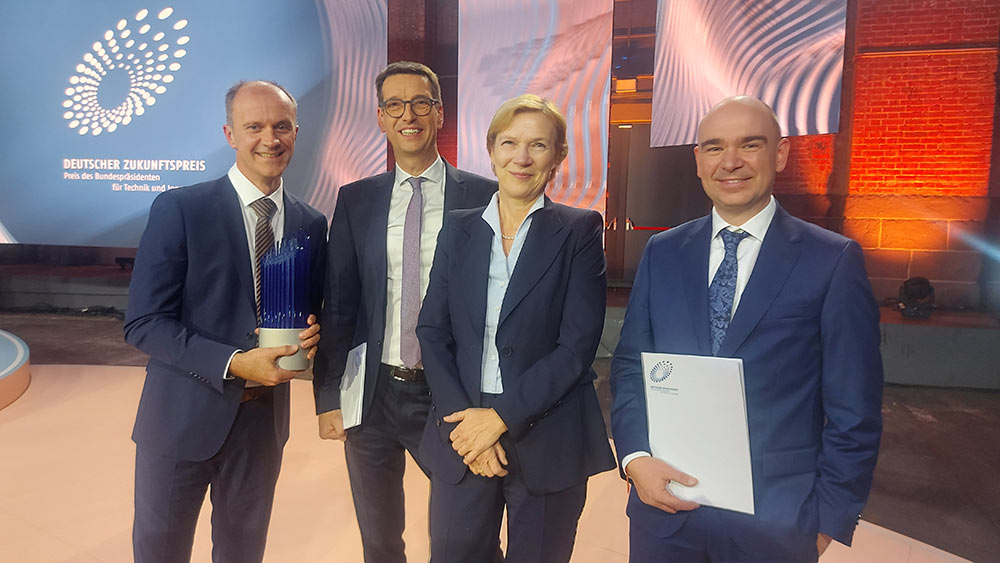
Last year, DPMA President Eva Schewior and other senior executives of the DPMA were once again members of juries or boards of trustees. In addition, our patent examiners proposed outstanding innovations for recognition. In 2023, the DPMA was involved in the following awards:
www.deutscher-zukunftspreis.de/en
The Deutscher Zukunftspreis award is the badge for the inventive creativity and innovative capacity of Germany. Alongside the high level of innovation, the successful commercialisation and the creation of sustainable jobs are conditions for the nomination. This award comes with prize money of 250,000 euros and has been presented by the respective federal presidents in person since 1997.
The DPMA President is a member of the board of trustees, which determines the direction of selection decisions.
Moreover, the DPMA is entitled to submit promising proposals to the jury which will then be considered in the procedure selecting the nominations or prize winners.
The 27th Deutscher Zukunftspreis award was presented on 22 November 2023 by Federal President Frank-Walter Steinmeier to the team of Siemens Healthineers AG, which had been proposed by the DPMA, for the development of a new magnetic resonance imaging system.
DPMA President Eva Schewior congratulated the winners of the Deutscher Zukunftspreis award. “We are very pleased that the top-class jury of the Deutscher Zukunftspreis award followed our proposal,” the DPMA President said. “The development of the magnetic resonance imaging system,” she recognised the achievement of the award-winning team, “intelligently combines existing high technology with additional innovations, opening up new fields of applications. This will benefit people in rural regions and poor countries where precise diagnostics has so far not been possible because of the expense.”
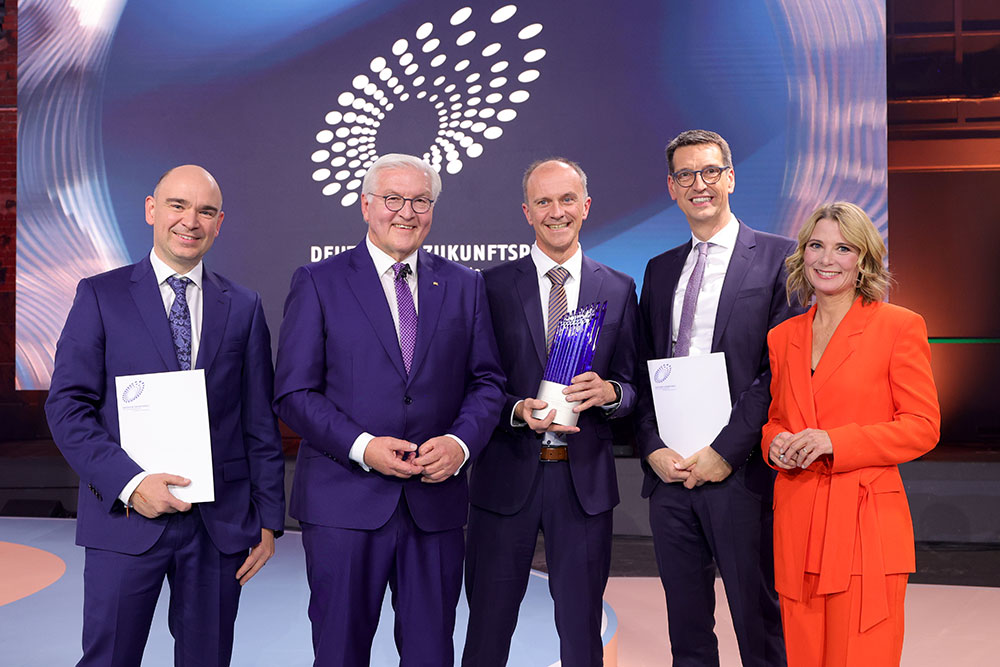
Compared to current magnetic resonance imaging systems, the innovation of Dr Stephan Biber and Dr David M Grodzki of Siemens Healthineers AG and Prof Michael Uder of Universitätsklinikum Erlangen offers several improvements: The patient bore has a width of 80 cm and is considerably more spacious, so even bariatric patients or patients with a tendency to claustrophobia can be treated with more comfort.
Thanks to the use of artificial intelligence, sharp images can be generated even at low field strengths. The weight of the devices and the amount of helium needed for cooling can thus also be reduced considerably. This means that, compared to current devices, using the MAGNETOM Free.Max makes imaging considerably more cost-efficient and much easier. As a consequence, MRI can also be offered in doctor’s surgeries in rural areas with relatively few treatments or in countries where only limited funds are available for health care.
Antje Bulmann, Viktor Fetter and Tobias Horn of Airbus Operations GmbH presented their direct air capture (DAC) innovation. DAC technologies extract climate-damaging CO2 from the atmosphere. A large fan draws air over specially developed amine filters, thereby binding CO2 as a solid. The separated, pure CO2 can then be stored underground. Alternatively, it can be used in finishing processes, e.g. for the production of fuels or as a fuel additive or as a fertiliser in greenhouses.
Jens te Kaat, Bernd-Henning Feller and Dan-Adrian Moldovan of Kueppers Solutions GmbH presented their new recuperative burner from a 3D printer. This burner is not dependent on a specific fuel. The recuperation of waste heat from the emissions of energy-intensive industrial furnaces and incinerators is an effective method for saving energy. The waste heat is used by the recuperator integrated into the burner. 3D printing is used to customise the system of Kueppers Solution GmbH to the application of the respective customer, so existing systems can be retrofitted at any time. Compared to conventional burners, companies can achieve substantial additional energy savings.
In 2023, there were two impressive examples of how important innovations recognised with the Deutscher Zukunftspreis award can be:
- Katalin Karikó and Drew Weissman were awarded the Nobel Prize in Physiology or Medicine 2023 for their mRNA research.
As early as 2008, at the University of Pennsylvania, they jointly succeeded in stabilising mRNA by replacing a nucleoside and making additional modifications. This is the basis for other research approaches to cancer treatment and for the successful use of mRNA for the first COVID-19 vaccine, developed essentially by the researcher couple Sahin/Türeci.
The very quick and effective implementation of the COVID vaccine won Prof Katalin Karikó, together with Prof Uğur Şahin, Prof Özlem Türeci and Prof Christoph Huber, the 2021 Deutscher Zukunftspreis award. - As early as 2000, Prof Karlheinz Brandenburg and his team of the Fraunhofer-Gesellschaft won the Deutscher Zukunftspreis award for the development of MP3 compression.
In 2023, he was honoured by the Society of Motion Picture and Television Engineers (SMPTE) in Hollywood for his visionary work on the development of the MP3 technology. The recognition underscores the sustained impact of Prof Brandenburg’s work on the media industry. “I have always enjoyed the combination of electronics and music. When the opportunity came, I was all for it,” Prof Karlheinz Brandenburg stated with regard to this further recognition.
The DPMA is entitled to nominate projects for the Deutscher Zukunftspreis award to the jury:
Please draw our attention to your projects! Proposals for nominations for the 2025 Deutscher Zukunftspreis award can be submitted at any time until the beginning of November 2024. For more information, visit our website.
The European Inventor Award of the European Patent Office (EPO) recognises inventors from all over the world who translate their ideas into technological progress, economic growth or improvements to everyday life. In 2023, more than 600 candidates from 12 countries were proposed who were indicated as inventors in at least one European patent granted.
“The European Inventor Award once again shows the entire range of European innovative capacity,” DPMA President Schewior said. “Special congratulations to all winners! Well done to the other finalists for their outstanding achievements too.” In particular, she stressed the achievements of German inventors in the past years. “The large number of inventions recognised with the Award in the past years shows how substantially German inventors contribute to innovation in Europe and underscores the immense importance of Germany as a country of innovation.” In the last 17 years, about 40 finalists and 17 winners of the European Inventor Award have had German roots.
The Finnish team of Pia Bergström, Annika Malm, Jukka Myllyoja, Jukka-Pekka Pasanen and Blanka Toukoniitty won the Award in the “Industry” category for the transformation of waste into renewable fuels. They convert wastes and residues such as animal fat waste and used cooking oil into high-quality renewable fuels. According to the company of the winners, their renewable diesel reduces greenhouse gas emissions by 75% to 95% compared to fossil diesel.
Chinese inventor Kai Wu and his team were able to reduce the fire and explosion risks of lithium-ion batteries in cars. They have developed a safety short circuit device (SSD) integrated into the battery. When triggered, this protection device stops the charging of the battery, thus eliminating the risks resulting from overcharging. The team received the Award in the Non-EPO Countries category.
The French team of Patricia de Rango, Daniel Fruchart, Albin Chaise, Michel Jehan and Nataliya Skryabina won the Award in the Research category and the Popular Prize for finding a safe and efficient way to store hydrogen. The atomic structure developed by the team and an innovative process open up a new possibility to increase the safety, sustainability and efficiency of hydrogen storage.
Irish physicists Rhona Togher and Eimear O'Carroll have invented a new, acoustic insulating material that helps avoid hearing damage caused by noise. Their adaptable material can be integrated into household appliances. There are also promising applications in the automotive, building and aerospace industries. The team was recognised in the small and medium-sized enterprises (SMEs) category.
Spanish chemist Avelino Corma Canós is a pioneer in synthetic catalysts. He was recognised in the Lifetime Achievement category. His great legacy is the Institute of Chemical Technology (ITQ, UPV-CSIC), which he co-founded and which advances chemical research in the following areas: energy, sustainability, health and water.
The Young Inventors Prize, created in 2022, recognises the initiative and creativity of young people. First place went to 22-year-old Kenyan inventor Richard Turere, a member of the Maasai tribe. His concern was to protect his family’s livestock without endangering the local lion population. To address this issue, he developed Lion Lights™, a system that uses light sequences to deter predators from approaching livestock. The system has been successfully adopted in several African countries and in India and Latin America.
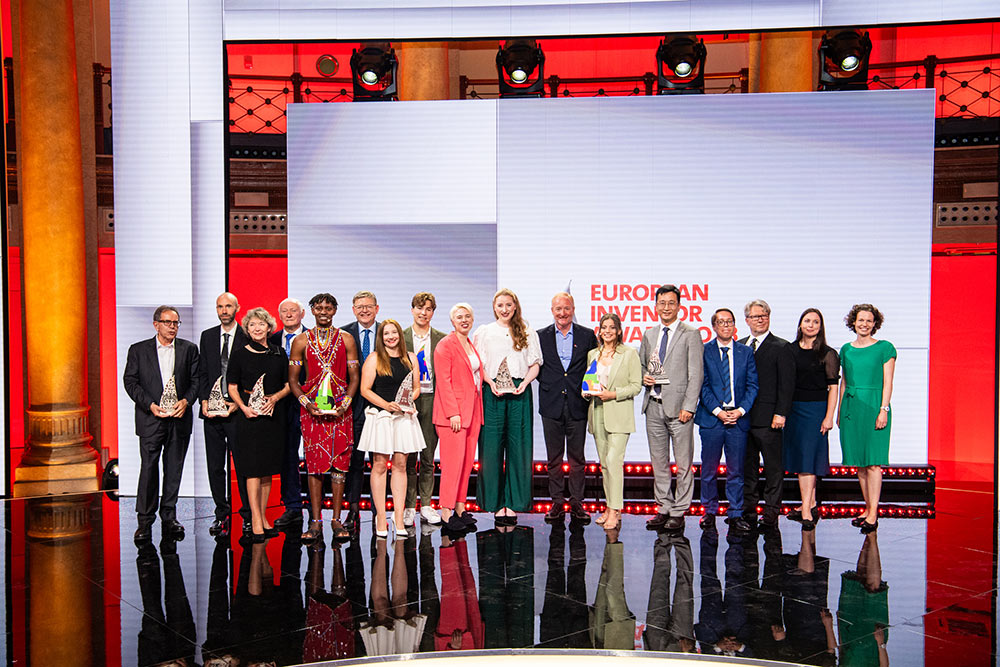
www.innovationspreis-thueringen.de (in German)
On 29 November 2023, the Thuringia Innovation Award 2023 was presented in Weimar by the Thuringian Minister for Economic Affairs, Science and Digital Society, Wolfgang Tiefensee, together with the Foundation for Technology, Innovation and Research of Thuringia (STIFT), TÜV Thüringen and the Ernst Abbe Foundation. The prize was awarded for the 26th time.
Five top innovations were recognised. Furthermore, special awards were given to an entrepreneur and a young enterprise. The Thuringian Ministry for Economic Affairs, Science and Digital Society provides the prize money amounting to a total of 100,000 euros, one of the highest for innovation awards in Germany. In addition, the Ernst Abbe Foundation provides the Special Award for Innovative Entrepreneurship and FUNKE Medien Thüringen provides the Special Award for Young Enterprises, which comes with prize money of 10,000 euros.
The award-winning inventions and innovations reflect the great innovative capacity of Thuringia and the traditional strengths of Thuringian companies, especially precision, lighting technology and health care. It is pleasing that the successful innovative activity is not limited to the well-established major companies, but that SMEs also put excellent innovations on the market. With 22 patent applications per 100,000 population last year, Thuringia kept its top position among the Central and Eastern German Länder. Even in the national ranking, Thuringia was 5th, a remarkable position.
Markus Ortlieb, head of the Jena sub-office, once again represented the DPMA in the 18-member jury, particularly clarifying questions relating to the state of the art and IP rights concerning the 50 submissions across all categories. The criteria for the jury’s decision to grant the award include the degree of innovation, entrepreneurial achievement, functionality, practical value and commercial success. Furthermore, the competition entries must have been launched or be about to be launched on the market. Another requirement is that the development and production of the submitted innovation have predominantly taken place in Thuringia.
The winners of the individual categories can be found on the website of the Thuringia Innovation Award.
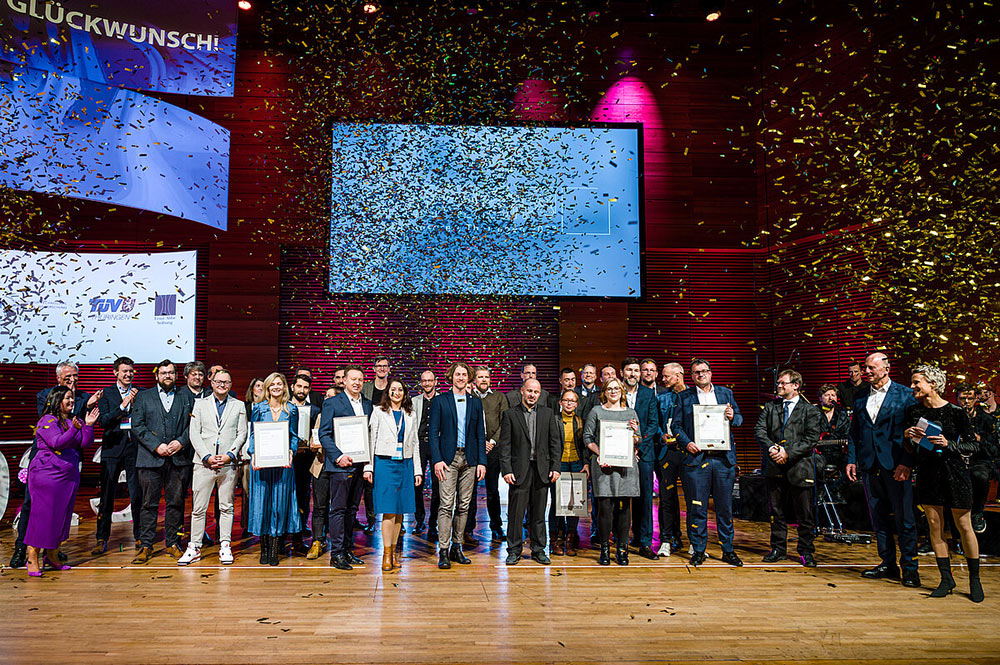
A youth contest, Jugend forscht is a unique network to foster talent in STEM subjects. Its track record is excellent. At the national finals in Bremen in mid-May 2023, there were 173 young scientists aged 12 to 21 to present 108 innovative research projects to an expert jury and the public and, of course, to win one of the coveted prizes.
Charlotte Klar and Katharina Austermann are two of these young scientists. They addressed the physical phenomenon that pyrolytic graphite can float above magnets arranged like a chessboard, investigating the effect of adding cold or heat on floating. After several experimental trials, they were able to prove that the force of repulsion increased as the graphite cooled down, thereby proving the temperature dependence of the magnetic characteristics.
They were awarded the Federal Chancellor’s Special Award for the Most Original Entry.
Inspired by his rescue service activity, Bastian Auer also did successful research, developing a comfortable electrocardiogram (ECG) system that uses only four instead of ten electrodes in an acute emergency situation. Neural networks reconstruct the lacking signals of the six electrodes that would be difficult to place to do a complete ECG for the detection of cardiac arrythmia. In recognition of this outstanding work, the expert jury presented him with the Federal President’s Award.
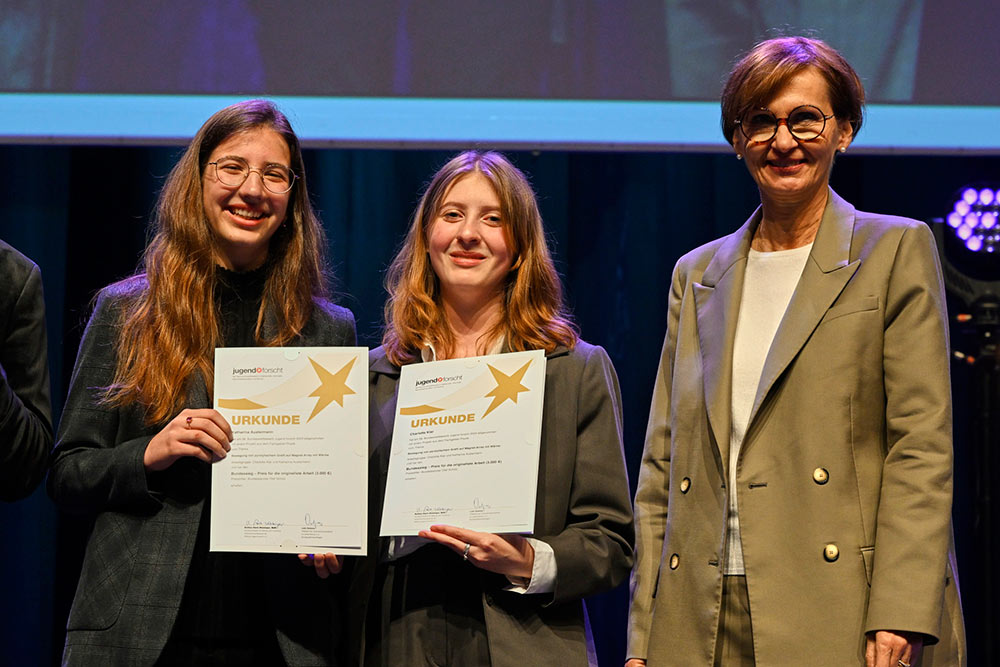
Moreover, it is remarkable that this 58th Jugend forscht contest saw a record proportion of girls. For the first time in the history of Germany’s best-known youth contest, the national proportion of submissions by girls was above 41 % (41.1 % to be precise). Keep it up, girls!
We wish all prize winners continued success in the future!
